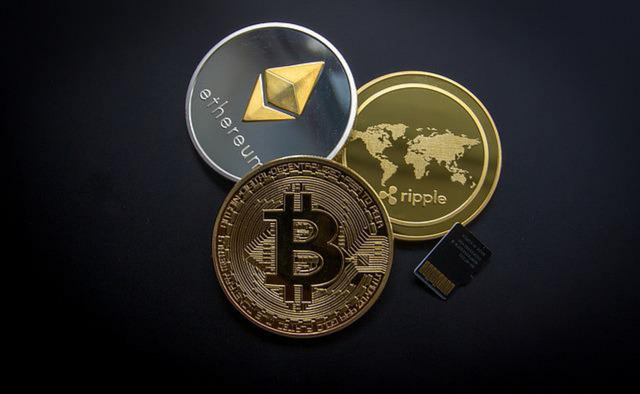Steemit Crypto Academy Contest / S2W1 - How Cryptocurrency has Shaped the Financial Realm. What is Its Future? by @talktofaith

Copyright free image from pixabay
Users are expected to briefly give an overview of cryptocurrency.
A cryptocurrency is a type of digital store of values which can be accepted as a mode of financial exchange and which operates in a manner that the records and transactions related to its exchange are usually kept with the use of cryptography in a decentralized system. Such records are not kept by central authorities.
The existence of such currencies can only be traced to digital platforms referred to as their native blockchains. Actually, there is no central authority that is given the right or opportunity to regulate or oversee the issuance of such digital currencies. As has already been said, use is made of decentralized systems for the recording and management of each unit of the digital currency.
How It Works
Ordinarily, cryptocurrencies are decentralized and operate with a digital technology of encryption. In the management of the euro or United States dollar you will discover that there are central authorities that are given the mandate of managing such traditional currencies. This means that the value of such currencies are maintained by such authorities. However, in the world of cryptocurrencies various users that act as different nodes share the broadly distributed task of performing the responsibilities that would have been carried out by these central authorities.
Most times people choose to invest their money into cryptocurrencies much in the manner in which they would also invest in precious metals, stocks or bonds. However, they could still be used for some other traditional purposes like being exchanged for goods and services especially by conventional companies or organisations that now accept them as a mode of exchange.
In 2008, a certain Satoshi Nakamoto in a book that was titled Bitcoin: A Peer-to-Peer Electronic Cash System gave out the principles that eventually resulted in the creation of the very first known cryptocurrency model, the Bitcoin. In this system of electronically transferring payment it is recognisable that rather than depending on trust of people for exchanging values or relying on third parties or intermediaries there is an electronic system which operates based on the principles of trustlessness for such transactions.
Generally, the world of cryptocurrency makes use of the blockchain.
What Is Blockchain Technology All About?
The blockchain technology refers to a form of digital technology that makes use of distributed ledgers in an open system as a way of keeping record of coded transactions. So many computers all over the world are made to have the same record in a sort of replicated check book that contains the same information and record of transactions in what is known as blocks. These blocks which is a record of transactions are now interlinked in a chainlike system of cryptocurrency transactions where a previous transaction links to a new one thereby giving rise to the name blockchain.
In essence what this does is that it gives everyone a copy of the same transactions that have been replicated over the system. Every new transaction that is added to the blockchain would be updated in real time in such a way that all the nodes receive the update at the same time. In this way every record is accurately kept in a manner that is very identical with what every other person has. There is a technique usually used to validate all such transactions to prevent fraudulent practices. These techniques come in various formats and some of such formats are the proof of work, proof of stake, delegated proof of stake, proof of burn mechanisms, etc.
Draw a comparison between cryptocurrency and conventional currencies.

Copyright free image from pixabay
In order to draw a comparison between cryptocurrency and conventional currencies, I will wish to enumerate a few differences between the two in the table below.
| Cryptocurrency | Conventional Currencies |
|---|---|
| There is no central authority that is in charge of the control and regulation of cryptocurrencies | Conventional currencies are controlled and regulated by central authorities like a country's Central Banks |
| Cryptocurrencies are mostly produced through a process known as cryptocurrency mining | New conventional currencies and usually minted and issued by the government |
| Cryptocurrencies cannot be felt physically and can only be obtained or exchanged online | Conventional currencies can be felt physically either as notes or as coins |
| Transactions with cryptocurrencies are indelibly registered or recorded on what is called blockchain for the purpose of references and transparency | Transactions with conventional currencies and not necessarily recorded in indelible forms and the records may not even be available to the public |
| Cryptocurrencies mostly have limited market cap as the supply could be fixed to a particular volume | Conventional currencies may not have limited market cap as governments may keep producing or issue new coins when necessary |
| Cryptocurrencies are majorly stored online in what is commonly referred to as digital wallet or they could still be stored in cold wallet | Conventional currencies are versatile and can be stored in different forms such as being kept in Banks or even being kept in such other wallet as PayPal or Payoneer |
Explain the distinctive innovations of cryptocurrency and its downsides.

Copyright free image from pixabay
There are quite a good number of new things that cryptocurrencies have brought to the table. One of such is the introduction of blockchain technology with it. I have already explained blockchain technology but there are some other innovations that are worthy of note. These include:-
Cryptocurrencies come with the innovation that they can be used as a good alternative source or system of making transactions or payments that comes at a very low cost
Owning wallets where there are domiciled means that one can claim ownership and access of the underlying digital store of value
Transactions with cryptocurrencies are usually carried out on platforms where such transactions cannot be reversed thereby making them very transparent and verifiable by public users and this reduces the risk of manipulation
There is the presence of multisignature wallet which means that assets on particular wallets can be commonly owned by different individuals who must collectively sign before the asset can be used
Cryptocurrencies can be easily accessed from any part of the world in a situation whereby one simply has to create an account or wallet
Nevertheless, there are still some disadvantages or downsides that can be associated with cryptocurrencies. Some of these disadvantages or downsides can include:-
- Problem of scalability:- Scaling is one of the biggest problems that is currently facing the blockchain of cryptocurrencies. This simply means that the number of transactions carried out per second is very small when compared to such other payment gateways like VISA.
- Too much volatility of price:- The cryptocurrency world experiences so much volatility in price. More so, as they are not inherently linked to any underlying asset of value. This made Warren Buffett to describe it as a bubble.
- Lack of proper regulation and governmental control:- The cryptocurrency world is not regulated or controlled by any government policies. This makes it difficult for investment in crypto space to be trustworthy. An example is the situation whereby investors lost more than $60 billion in the Luna crash and nothing was done to Do Kwon, the person behind the project.
How do you think major problems with cryptocurrency can be handled? Let this be a response to the downsides highlighted earlier.

Copyright free image from pixabay
In this section I would like to describe a few ways by which some of the major issues I have identified can be handled.
Scalability
Usually, for transactions to be validated in blockchains all the participating nodes would have to take part in this process of validation. This creates a limitation in the speed of processing large transactions. There have been a few proposed solutions to this problem some of which includes the use of nested blockchains where the infrastructure for validation is decentralized and also sharding in blockchain have been explored as a solution to this problem.
Too much volatility
One of the major ways through which the problem of too much volatility in blockchains has been addressed is the introduction of stablecoins. With the use of stablecoins one can safely get into the cryptocurrency market without quickly or immediately being hit by the volatility of any coin. Hence, such an investor can time his entry into any coin with the intention of probably buying low and selling high in order to make profit.
Regulation
The cryptocurrency market should be regulated and controlled by the government. This is my strong belief. This would greatly help to increase people's trust in the world of crypto and drive further adoption of cryptocurrencies. Joe Biden, the United States president has passed an executive order on digital assets which required that some specific questions would have to be answered by government agencies as a way of validating the usefulness, necessity or otherwise of cryptocurrencies. Such government regulations are necessary in order to build trust in the world of cryptocurrencies.
Do you believe in the future of cryptocurrency? State your reasons. Any Recommendations?

Copyright free image from pixabay
Cryptocurrencies have become very popular all over the world and have been quite tremendous adoption and usage in so many quarters. Majorly, this is based on the fact that it comes with quite a huge number of advantages and innovative ways of doing things. Some of these innovations have been discussed earlier such as trustlessness, immutability of transactions and proper recording of events that prevent fraudulent usage.
I do believe that although the cryptocurrency market is currently in a bearish season there is a great future for cryptos. Moreover, even stocks are tanking even in this period. Some of the major reasons why I believe good does have a good future include:-
- The use of cryptocurrencies in transactions removes the risk of fraudulent practices due to the fact that it involves blockchains where transactions are transparently and immutably recorded.
- The use of cryptocurrencies increases the speed of transactions as ordinary bank transfers can take days and even weeks to complete especially for intercontinental transactions but with cryptos you only have to exchange crypto wallets and it will be done in a matter of seconds no matter your location or distance apart globally
- The use of cryptocurrency and blockchain eliminates the influence of third parties and intermediaries who may likely increase the cost of processing transactions. This is a bonus as a lot of services can be completed without too much expenditure.
- Not the least, cryptocurrencies have gone a step further by giving people total control over their own funds as people may not have to rely on financial institutions or banks any longer to store their money. Such funds can simply be kept in a digital wallet or even cold wallet from where they can be expended at will.
CONCLUSION
Cryptocurrencies come with a great number of advantages which can include making trustless transactions that do not require third parties or intermediaries a possibility, making it possible for immutable and publicly accessible financial records to be created. There are quite a number of differences between cryptocurrencies and the conventional. Some of these include the fact that cryptocurrencies are not issued by any central authority while conventional currencies are usually controlled by governmental agencies.
As a way of controlling some of the problems of cryptocurrencies in order to make them more useful a solution known as sharding as well as nested blockchains have been proposed to handle one of the major issues which is scalability and low throughput in cryptocurrencies. Furthermore, government regulations are necessary to increase the trust of people and thereby drive further adoption of cryptocurrencies.
Sin duda las criptomonedas tienes grandes ventajas amiga estoy de acuerdo contigo, aunque estemos pasando por una temporada bajista todos los mercados se han visto afectados y sin duda las criptomonedas aún tienen mucho futuro y mucho para sorprendernos.
Buena publicación bastante completa te felicito!
Thanks for visiting.
Brilliant and educative write up dear sister. I must confess that I've learned something from your entry which will also help me in my entry.
I couldn't agree less with this
Investing in crypto is totally great and safe.
Best wishes
I am glad that you learnt something from my assignment.
Thanks for visiting.
Best regards
You're welcome
This is the kinds of entry I love reading, very informative, I will see to this stated solution such a sharding and nested blockchain, i will look into what proposal it is and what and how it will help the crypto race
The issue of regulation in most countries is a big shot on cryptocurrency, imagine the adoption of cryptocurrency world wide, wow, i cant believe such will exist cos our vision are different
What a publication you have delivered
Best if luck
Thanks for the comment entry.
Yeah adopting cryptocurrency world wide will soon come in a short while.
We have started seeing the tip.
You are welcome